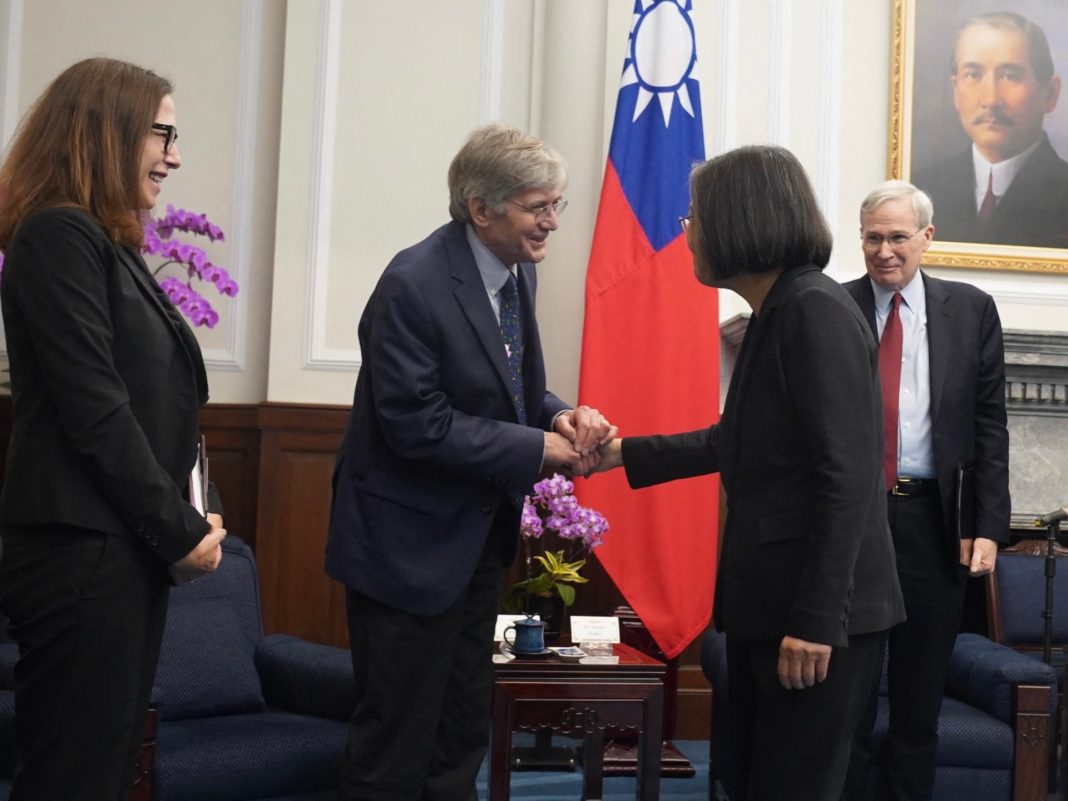Taiwan’s President Tsai Ing-wen and President-elect William Lai Ching-te have hailed the support of the United States for the self-ruled island in meetings with an unofficial delegation from Washington amid anger in Beijing at overseas governments’ congratulations of Taiwan on its weekend election.
The US delegation – including former US National Security Adviser Stephen Hadley and former Deputy Secretary of State James Steinberg – arrived in Taiwan on Sunday, a day after Lai, currently the vice president, won an unprecedented third term for the ruling Democratic Progressive Party (DPP).
Beijing, which claims Taiwan as its own and has not ruled out the use of force to achieve its objectives, has long criticised Lai as a so-called “separatist”. It cast the election as a choice between “peace and war”.
In the event, Lai won 40.1 percent of the vote compared with 33.5 percent for Hou Yu-ih of the nationalist Kuomintang (KMT) party, his nearest rival.
During his meeting with the delegates on Monday at DPP headquarters, Lai said freedom and democracy were “the most valuable assets for the Taiwanese people, and the sacred mountains to protect Taiwan”.
Lai added that they were “core values” shared by both Taiwan and the United States, and “the foundation for the long-term stability in Taiwan-US partnership,”
He told the delegation their visit was “meaningful” and a demonstration of the strength of the partnership between the US.
“It is of great significance to Taiwan,” he said.
Lai will formally take over as president on May 20.

The delegation earlier met President Tsai Ing-wen who was ineligible to run for re-election having served two terms.
“Taiwan’s democracy has set a shining example to the world,” Hadley said in comments released by Tsai’s office.
“We are honoured to have the opportunity to meet with you today to reaffirm that the American commitment to Taiwan is rock solid, principled and bipartisan and that the United States stands with its friends,” he added.
“Your visit is highly meaningful. It fully demonstrates US support for Taiwan’s democracy and highlights the close and staunch parntership between Taiwan and the US,” Tsai told the delegates.
War of words
The DPP says that the 23.5 million people of Taiwan should decide the island’s future and has said that it backs the status quo, in which Taiwan governs itself but refrains from declaring formal independence.
Beijing insists that the island is part of its territory. After the election, it said that what it terms “peaceful reunification” was inevitable.
It lashed out at countries that sent their congratulations to Taiwan over the smooth-running of the vote.
In a statement, China’s Ministry of Foreign Affairs condemned US Secretary of State Antony Blinken for congratulating Lai on his victory and added: “The basic fact that… Taiwan is part of China will not change.”
Taiwan said that statement was “completely inconsistent with international understanding and the current cross-strait situation. It goes against the expectation of global democratic communities and goes against the will of the people of Taiwan to uphold democratic values. Such cliches are not worth refuting”.

Washington follows a policy of what it calls “strategic ambiguity” on the island. While it maintains formal diplomatic ties with Beijing, it is required by law to support Taiwan and is opposed to any attempt to change the status quo by force.
The last time a US delegation visited immediately after an election was in 2016, after Tsai was first elected president.
At that time, Beijing refused her offer of talks and cut off all high-level communications with the island.
In the years since, it has sent fighter jets and navy ships into the skies and waters around the island, and encouraged Taiwan’s few remaining formal allies to switch allegiance.
After his victory, Lai said he hoped for a return to “healthy and orderly” exchanges with China, and reiterated his desire for talks on the basis of dignity and equality.
While Lai won the election, the DPP lost its majority in the legislature, finishing with one seat less than the KMT. With neither holding a majority, the Taiwan People’s Party, a relative newcomer that won eight of the 113 seats, looks set to become increasingly influential in policymaking.
China’s Taiwan Affairs Office said on the heels of those results that “the Democratic Progressive Party cannot represent the mainstream public opinion on the island”, according to Xinhua.
In response, Taiwan’s Foreign Ministry called on China “to respect the election results, face reality and give up its oppression against Taiwan”.
In recent months, the US and China have been trying to rebuild ties strained not only by Taiwan but a host of other issues, including the COVID-19 pandemic, trade and the appearance last year of an alleged Chinese spy balloon over the US.
The American Institute in Taiwan, the de-facto US embassy, said the US government had asked Hadley and Steinberg “to travel in their private capacity to Taiwan”.
Hadley said he was looking forward to meeting Lai and other political leaders.
“We look forward to continuity in the relationship between Taiwan and the United States under the new administration, and for common efforts to preserve cross-strait peace and stability.”
Taiwan’s government says Beijing has no right to speak for the island’s people or represent them on the world stage.







